Peter MALONE
Saturday, 18 September 2021 19:24
Great Santini, The
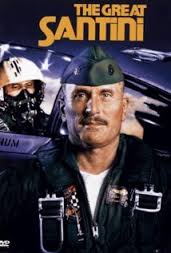
THE GREAT SANTINI
US, 1979, 115 minutes, Colour.
Robert Duvall, Michael O'Keefe, Blythe Danner.
Directed by Lewis John Carlino.
The Great Santini is an excellent film based on a novel by Pat Conroy (Conrack, Sounder). It is an excellent film about family life and relationships. It is set in the early '60s, a time of idealising the family and yet of change. Robert Duvall is excellent (and was Oscar-nominated) as Bull Meechum, a Sky Devil and expert flyer who expects his family to life his military precision and ideals. Blythe Danner is his supportive wife. Michael O'Keefe is also excellent as Ben, his eldest son (and was also Oscar-nominated).
The film not only shows family life, the context of the '60s, but also raises a number of themes, especially in the South with racism.
The film is written and directed by Lewis John Carlino (The Sailor Who Fell From Grace With The Sea, Class).
1. The impact of the film? Its quality? Portrait of family? The adaptation of the novel by Pat Conroy?
2. The atmosphere of the 1960s, the air bases, the southern towns, the aerial photography? Musical score?
3. The introduction to Bull Meechum, the nickname The Great Santini? Sky Devil, his experiences of the war? Toasting the corps and the elite? His general behaviour, the dance, vomiting, the prank in the toilet and his blah explanation? His friendships4 greeting, wrestling? Comparisons? His greeting his family, the move, talking to his son and the expectations of the Meechums? Tenderness to his wife? Things not changing, gung-ho attitude? References to dinosaur and throwback of the species? Warrior without a war? Being beaten at basketball, taunting Ben? Condemning him as a girl? The practice in the rain? Praying for war? Wanting to give his son the gift of fury? His competence with the flyers? Wanting them to see him as God, the burning bush? Pre-game tension and signals? Enigma? His daughter wanting to know could a girl be a Meechum? Ben's birthday party, the drunken rambling, spoiling the birthday party? His daughter taunting him with conversation, being pregnant by a homosexual negro bald pacifist, etc? The, playing of the game? His anger with Ben, Ben throwing the game? His being down on Ben? Clashes with Lilian? The scene with Tooma and Ben's confrontation of him, Tooma's death? The partial reconciliation and understanding? His going off to. fly, the heroism of his saving the plane crashing into houses? His death? Portrait of an old-fashioned warrior?
4. Ben as the oldest child, with his sisters, talking with his mother, meeting his father, the talk’ in the car, the drill’ inspections, not wanting to go into service, resenting his father, the baseball, the friendship with Tooma, the dog? Red and the fishing? Talking with Tooma, school? 4 a.m. birthday present and jacket? Bull reminiscing about the day Ben was born? World War Two, the orders about the party? His mother's letter about being a man? Gentleness the best quality? Her blessing and’ love? His life as a gift to her? Breaking boundaries of love? Taunts about drinks, martinis? His father's toast? His praise of his son, making him drunk, Ben 'really great' to carry on? Carried in by his father? The pre-game tension? Dad in the locker-room and giving orders? The playing of the game, Ben's throwing the ball, the fight? The coach and his comment about standing up to his father? Phoning his father about Tooma, finding him? 'Nobody tells you anything'? The fight in the kitchen, Bull going out by himself, Ben finding him after his mother asked him to? The reconciliation? Declaration of love? Running off, the game and the taunt? The white, coat, the photo, the family, the dance? Waking his mother?. Concerned about his father? The Rosary: we will not cry, cry now, tomorrow no tears? Ben coming down to his mother, used to praying for the plane not to crash? The family
5. The portrait of Lilian, the loving wife, support of her husband, her care?
6. The sketch of the sisters, their place in the home, girls not being able to be Meechums, the older girl wanting a talk with her father, sending him up? His sour reactions? The grief at their father's death?
7. Tooma and his friendship, the cruelty in the South, being black, sharing with Ben, the antagonism of Red and the others, the bees, turning them on Red, his wanting revenge, coming against Tooma, Tooma with the dogs, the accidental shooting? The result of the hatred? Tooma and Ben, the pathos of his death?
8. The sketch of Red and the Rednecks, taunting, the bees, the shooting?
9. The picture of the American air force, its ethos, the bases, the homes, the bars, friendships, drinking together, toasts, camaraderie, elitism? The aerial sequences?
10. The background of basketball, its place in the American consciousness, Ben and his skills, the advice of the coach?
11. The build-up to the finale, Bull and his flying, the fire, not wanting to harm people, ditching in the-sea?
12. A portrait of credible people? A portrait of family tensions? The strength of the American background, military, religious? Yet the fights, the hurts, the reconciliations?
Published in Movie Reviews
Published in
Movie Reviews
Tagged under
Saturday, 18 September 2021 19:24
Great Race, The
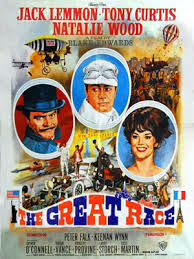
THE GREAT RACE
US, 1965, 163 minutes, Colour.
Jack Lemmon, Tony Curtis, Peter Falk, Natalie Wood, George Macready, Ross Martin, Vivian Vance, Dorothy Provine, Keenan Wynn.
Directed by Blake Edwards.
The Great Race was one of the spectacular comedies of the '60s. It was directed by Blake Edwards who had made his mark with some bright comedies in the late 1950s and early 160s as well as some dramas e.g. Days Of Wine And Roses. By the mid-'60s he had made The Pink Panther and A Shot In The Dark and was to take up the Pink Panther series with Peter Sellers in the '70s. His films in the late '60s and early '70s were not successful but he made a spectacular comeback with the Pink Panther films and '10' in the '70s - all satirised in his S.O.B.
The Great Race fits into the race genre - similar to such films as Those Daring Young Men In Their Flying Machines. Tony Curtis is all genial and dazzling white as the hero, Jack Lemmon in black as the villain (with the chance to do a parody of The Prisoner of Zenda as an effeminate European monarch). Natalie Wood is the vigorous heroine. There is a good supporting cast. Special effects are spectacular - and there are many homages to the film traditions especially with The Prisoner of Zenda, the western brawl and the most colourful pie-throwing sequence in cinema history. There is a Henry Mancini score with The Sweetheart Tree and Dorothy Provine singing a vigorous He Shouldn't-a. Entertaining in its way - but it does go on for a long time.
1. The popularity of the spectacular race film - cars, planes? The spectacles and comedies of the '60s? The tradition of American comedy - visual, slapstick? The Chaplin, Laurel and Hardy, Keaton techniques and Blake Edwards' homage to them?
2. Blake Edwards and his comic talent - visual, slapstick, boisterous? The stars and their status in the '60s - hero and villain? Heroine? Their comic abilities? The parallels to the comedy tradition, cartoons - e.g. The Road-Runner? Romance? Suffragette films? Parody of westerns and The Prisoner of Zenda?
3. Panavision colour photography, the titles and their tone? Special effects especially in the introduction to Professor Fate and The Great Leslie? The spectacular accidents? Period, variety of locations - American, Alaskan, European? Henry Mancini's score and songs?
4. The basic comic plot and competitive plot? Hero and villain, jealousies and rivalries? The dramatic momentum of the race and the dirty tricks? The conventions of the newspaper reporter - with the feminist touch? The European car pursuit? The Prisoner of Zenda?
5. Villain and hero in black and white? The conventions of the American hero - talk, dress, teeth sparkling? The villain with clothes, moustache, henchman? The allusions to the Road-Runner? cartoons in the initial accidents? Peter Falk and Keenan Wynn as the henchman and assistant?
6. The newspaper background - and the conventions of harassed editors, editors' wives., demonstrations? The suffragette issue? The demonstrations and Maggie and her being chained? Her push, capacity for talking? Going on the race, using the pigeons? Being stranded in the west? The clashes with Professor Fate, his kidnapping her? Her power over The Great Leslie? The jealousies? The happy ending kiss - the spirit of The Sweetheart Tree!
7. The presentation of machines, inventions,, cars? Development of the various models of cars and the ingenuity of the times? Races and speed? The history of the development of the car? Nostalgia for old cars?
8. The range of American landscapes? The dirty tricks within the landscapes? Indians, the open road, the bar-room song and the long bar-room brawl, Alaska and the ice floes?
9. The humorous contrast with Russia (in the spirit of the '60s?) and their seriousness? Potsdorf and The Prisoner of Zenda? Jack Lemmon's performance as the twitty king? The baron and his plot, the general and his allegiance? The substitution of the king? Jack Lemmon and his contrasting styles as Fate and the king? The duel and Tony Curtis paying homage to his own films of the '50s? The spectacle of the coronation? The culmination in the pie-throwing sequence - quantity, colour and the visual designs on the screen?
10. The build-up to the finish of the race, Professor Fate and his wanting to win a race, Maggie and Leslie kissing? The only possibility for Professor Fate to want a new race?
11. How effective was the comedy, the quality of the laughs? The delineation of the characters - human or comic strip types? Caricatures? comic situations and their effectiveness? The length of the film, boisterousness - comments that it was a rather bloated comedy?
12. The American issues - heroes and heroines, villains, competitiveness~,1 traditions of good and evil, good overcoming evil? The feminist touch of the '60s?
Published in Movie Reviews
Published in
Movie Reviews
Tagged under
Saturday, 18 September 2021 19:24
Great McGinty, The
THE GREAT McGINTY
US, 1940, 83 minutes, Black and white.
Brian Donlevy, Akim Tamiroff, Muriel Angelus, Louis Jean Heydt, Arthur Hoyt.
Directed by Preston Sturges.
The Great McGinty? was the first film directed by eminent comic screenwriter Preston Sturges. He was to go on to make films like Sullivan's Travels, Hail the Conquering Hero, The Miracle of Morgan's Creek during the '40s. Sardonic but optimistic films about the American way of life.
This film has small budget style from Paramount In the early '40s, has Brian Donlevy as a star (very credible) and matches him with Akim Tamiroff. Nevertheless, despite the small budget, the film is an excellent characterisation, satire on American democracy and its abuses.
1. Good comedy, optimism through satire?
2. The writing of Preston Sturges, his moving into direction, his comic satiric
classics of the '40s?
3. Paramount production values, black and white photography, sets, the stars?
4. The framework: the opening comment about the man who made mistakes all his life and did one good deed contrasted with the man who did everything right and did one small thing wrong. Their destinies? The flashback
structure of tie film - and the humorously ironic ending?
5. The portrait of Thompson, his embezzlement, his presence in the sleazy club, the girl, his desperation, listening to McGinty's story?
6. McGinty? telling his story, deadpan style of delivery? His property, buying the boats? buying 37, getting the money, the agent and the interaction with him, going to the Boss who appreciated his success? His getting the job, his standover tactics for getting protection money, the mixture of violence and charm, raising $1100 and the Boss giving it to him? His independent attitude, cheeky? Becoming an alderman, his work? In the background, Katherine as secretary and her economic theories? The Boss proposing that he run for Mayor, agreeing? The interactions with the Boss? The money deals? Katherine and the question of marriage, her proposal in an objective manner? A deal and arrangement? The wedding ceremony, the comic style, his going his way and she going hers? Looking over the house? Discovering the kids? His mellowing with Katherine, with the kids? Standing up for her? Falling in love?. The discussion about graft and the opportunities for helping the poor in the cities? His memories of his youth, working in the factory, dignity? His explanations about the system? The proposal that he run for governor, the parade, the election campaign? His election, his finally taking a stance against the boss about dams and buildings? The arrest, in prison, his arrangements for Katherine and the children, their education? His escape? The finale? Portrait of a tough guy with a human
heart?
7. Katherine, secretary, her philosophy of economy, the marriage proposal, the arrangement, her friendship with George, McGinty? and his working well with the kids, reading them stories? The house, the end and her trying to help?
8. The Boss, behind the scenes, buying votes for the mayor, always present, the protection racket, relationship with McGinty?, giving him the money, the political victories? The final confrontation? Both in jail?
9. William Demarest as the helper, buying the votes, his role in the election campaign, highlighting the populist philosophy in comparison with the campaigner telling the people the truth? His place at the end?
10. The picture of elections, vote-catchers and buyers, helpers? Businessmen and their deals? The picture with 75,000 people in the stadium - and graft?
11. The picture of American cities, money, power, people?
12. The end and its ironic humour?
13. The picture of a good man, opportunity, lacking opportunity, caught in systems? Doing a good deed?
US, 1940, 83 minutes, Black and white.
Brian Donlevy, Akim Tamiroff, Muriel Angelus, Louis Jean Heydt, Arthur Hoyt.
Directed by Preston Sturges.
The Great McGinty? was the first film directed by eminent comic screenwriter Preston Sturges. He was to go on to make films like Sullivan's Travels, Hail the Conquering Hero, The Miracle of Morgan's Creek during the '40s. Sardonic but optimistic films about the American way of life.
This film has small budget style from Paramount In the early '40s, has Brian Donlevy as a star (very credible) and matches him with Akim Tamiroff. Nevertheless, despite the small budget, the film is an excellent characterisation, satire on American democracy and its abuses.
1. Good comedy, optimism through satire?
2. The writing of Preston Sturges, his moving into direction, his comic satiric
classics of the '40s?
3. Paramount production values, black and white photography, sets, the stars?
4. The framework: the opening comment about the man who made mistakes all his life and did one good deed contrasted with the man who did everything right and did one small thing wrong. Their destinies? The flashback
structure of tie film - and the humorously ironic ending?
5. The portrait of Thompson, his embezzlement, his presence in the sleazy club, the girl, his desperation, listening to McGinty's story?
6. McGinty? telling his story, deadpan style of delivery? His property, buying the boats? buying 37, getting the money, the agent and the interaction with him, going to the Boss who appreciated his success? His getting the job, his standover tactics for getting protection money, the mixture of violence and charm, raising $1100 and the Boss giving it to him? His independent attitude, cheeky? Becoming an alderman, his work? In the background, Katherine as secretary and her economic theories? The Boss proposing that he run for Mayor, agreeing? The interactions with the Boss? The money deals? Katherine and the question of marriage, her proposal in an objective manner? A deal and arrangement? The wedding ceremony, the comic style, his going his way and she going hers? Looking over the house? Discovering the kids? His mellowing with Katherine, with the kids? Standing up for her? Falling in love?. The discussion about graft and the opportunities for helping the poor in the cities? His memories of his youth, working in the factory, dignity? His explanations about the system? The proposal that he run for governor, the parade, the election campaign? His election, his finally taking a stance against the boss about dams and buildings? The arrest, in prison, his arrangements for Katherine and the children, their education? His escape? The finale? Portrait of a tough guy with a human
heart?
7. Katherine, secretary, her philosophy of economy, the marriage proposal, the arrangement, her friendship with George, McGinty? and his working well with the kids, reading them stories? The house, the end and her trying to help?
8. The Boss, behind the scenes, buying votes for the mayor, always present, the protection racket, relationship with McGinty?, giving him the money, the political victories? The final confrontation? Both in jail?
9. William Demarest as the helper, buying the votes, his role in the election campaign, highlighting the populist philosophy in comparison with the campaigner telling the people the truth? His place at the end?
10. The picture of elections, vote-catchers and buyers, helpers? Businessmen and their deals? The picture with 75,000 people in the stadium - and graft?
11. The picture of American cities, money, power, people?
12. The end and its ironic humour?
13. The picture of a good man, opportunity, lacking opportunity, caught in systems? Doing a good deed?
Published in Movie Reviews
Published in
Movie Reviews
Tagged under
Saturday, 18 September 2021 19:24
Great Man, The
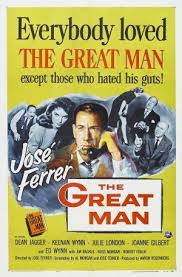
THE GREAT MAN
US, 1957, 92 minutes, Black and White.
Jose Ferrer, Keenan Wynn, Julie London, Ed Wynn, Dean Jagger, Jim Bacchus, Joanne Gilbert.
Directed by Jose Ferrer.
The Great Man is one of those entertainingly nauseating examinations of business manipulation. This time the area of exposure is radio and television where the age-old theme of appearance versus reality can have ample scope.
Jose Ferrer directs himself as a run-of-the-mill media reporter who is assigned to compile a programme to be relayed across the U.S. as a tribute to a T.V. personality killed in an accident. Before we know anything of the great man himself, we are prepared for an expose in watching the callous Public Relations' style planning and arrangements for the funeral. As regards the personality of the great man himself it is downhill from there. The unmasking of any public figure always has a kind of morbid fascination for the public and this is part of the reason why we enjoy a film like this. Of course, it is well acted and put together, using techniques of drama, interview, news reporting and so on. The dialogue is a strong point of the film. In many ways it is obvious, the type of thing you would expect in an expose film, but it is sufficiently 'bitchy' and biting to make us wince in appreciation.
1. What was the target of attack in this film?
2. Is the mass media organisation, control and manipulation as scheming and callous as this? Why?
3. What was 'The Great Man' himself really like? Why did he come across so well to people - his personality itself, or his Public Relations promotion?
4. The screenplay is filled with caustic comments by the media and nauseating hypocrisy by those who try to give the people 'what they want', Give examples, How much cliche is there in these examples, how much truth?
5. Was disgust with people the principal reaction to this film?
6. What kind of man was the hero? Why did he get involved in the programme? Was he ambitious to take the great man's place?
7. Sid Moore - how important was he in the radio and T.V. world? What kind of character was he? How was he ousted from his hold over the studio?
8. Comment on the funeral arrangements, the queuing up of the public and the taped interviews. Were they 'typical' interviews? What did you think of the way they were edited?
9. Carol - was she telling the truth about 'The Great Man'? What did she reveal about him?
10. What did his press agent reveal? Ed, the programmes' editor?
11. Mr. Beazley - were you impressed by what he said and did? What did he reveal of 'The Great Man'? How did Joe Harris react to him? What effect did his actions ultimately have on Joe Harris?
12. The Blood Bank broadcast - was it moving? How did it affect Joe Harris at first; then, when Sid revealed it was a fake?
13. Explain the influence of Mr. Carlton, the manager of the station. How diplomatic, business-like and shrewd was he?
14. How did the investigation change Joe Harris, especially his final broadcast?
15. Joe was being sincere in his final broadcast, but had really been manipulated by Mr. Carlton, who won the whole thing, How did this happen?
Published in Movie Reviews
Published in
Movie Reviews
Tagged under
Saturday, 18 September 2021 19:24
Gypsy and the Gentleman, The
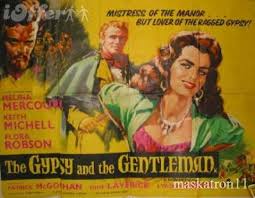
THE GYPSY AND THE GENTLEMAN
UK, 1957, 107 minutes, Colour.
Melina Mercouri, Keith Michell, Patrick Mc Goohan, June Laverick, Flora Robson.
Directed by Joseph Losey.
The Gypsy and the Gentleman is a very colourful, even turgid, romantic melodrama from the Regency period. It is based on a novel called 'Darkness I Leave You' by Nina Warner Hooke.
There is vivid colour photography by veteran Jack Hildyard - which has its origins in the art and painting of the period, especially sporting prints. Direction is by American Joseph Losey (The Boy With Green Hair, M, The Prowler, The Dividing Line, The Big Night in the U.S.A.). Losey was blacklisted and worked in England during the early 1950s e.g. The Sleeping Tiger. With Time Without Pity he was able to publicly present his own name. This film followed Time Without Pity. He was then to work in England with great success in the '60s - The Servant, King and Country, Accident and then in France in the '70s and '80s.
The film has a strong cast and gives an opportunity for Melina Mercouri to show her eye-flashing exuberance. Patrick Mc Goohan was at the beginning of his career and there is strong support from a group of veteran British actors and actresses. The film has echoes of the rather lurid melodramas made by Gainsborough Studios in the '40s with Stewart Granger and James Mason. A cinema oddity.
1. Audience enjoyment of period melodramas? The rather high-blown style of the film? Much larger than life? The tradition of British melodrama with the colourful touch?
2. The value of the colour photography - the re-creation of period, homes and mansions, costumes? The lavish style? The wealthy Regency aristocracy and the gypsies? The musical score?
3. How well did the film use its romantic conventions? The Regency rake and his extravagance? The flashing gypsy and her lover? The plot against the aristocracy? The persecution of the younger sister even to madness? Fist-fights, gypsy pursuits? The final melodramatic climax?
4. The importance of the background - the period of the Regency, English aristocracy and their arrogance? Wealth and extravagance? Values, morals? The propriety of society? The role of the gypsies in England? The hot-blooded contrast with the English? The stereotypes of gypsies as villains?
5. The portrait of Sir Paul Deverill? Recklessness, squandering money, wild pleasure? Sport and fighting? Drinking? His obsession with Belle? His pursuing her? The reckless lifestyle? His marrying her? Her discovering the truth about the money? His love for his younger sister? The plot against Sir Paul and Sarah? His reaction to his sister's decline? His drinking and signing the committal papers? The melodramatic build-up and the coach going crashing? His final realisation and his death and his killing Belle?
6. Melina Mercouri's strong and vivid presence as Belle? The gypsy lifestyle? Her relationship with Jess? Her response to Sir Paul? Encouraging him? The marriage? Her reaction to learning he had squandered his fortune? Her place in the household? The reaction of the aristocracy? The discovery about Sarah's wealth? The lawyer and the plots? The persecution of Sarah? Putting her into the asylum? The commitment papers? Her rescue? The finale and her being killed by her husband? Her relationship with Jess - characters, stereotypes?
7. Sarah and her youthfulness, the wealth. place in the household? Her being persecuted? The plot against her? Her escape, capture. the signing of the papers? Her relationship with John? His rescuing her?
8. The background of gypsy life - the details of lifestyle and presence in the English countryside? The contrast with the aristocracy?
9. The picture of Regency England? Morals and manners? Wealth? Expectations? Sir Paul and the gypsies contrasting with these?
10. The gallery of minor characters and their contribution to plot?
Published in Movie Reviews
Published in
Movie Reviews
Tagged under
Saturday, 18 September 2021 19:24
Gypsy
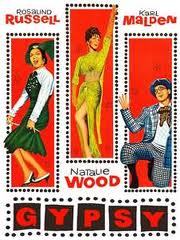
GYPSY
US, 1962, 149 minutes, Colour.
Rosalind Russell, Natalie Wood, Karl Malden.
Directed by Mervyn Le Roy.
Gypsy is a big brassy musical, a vehicle for Rosalind Russell's talents as she portrays the mother of Gypsy Rose Lee and June Havoc. She is a dynamic woman and an overpowering mother. The film also features Natalie Wood as the young Gypsy Rose Lee and the story is based on her autobiography. The film re-creates the period of the '20s and '30s and all the razzamatazz of showbiz dreams. The film features the very popular Jule Styne score. Styne was also to write Funny Girl which highlighted Barbra Streisand. The film was directed spectacularly although not entirely successfully by Mervyn Le Roy who had been a director since the early '30s, making gangster films like Scarface, romantic films like Blossoms In The Dust and Random Harvest. Nevertheless, Gypsy is quite entertaining.
1. Was the title focus right for this film? Or was Rose the central character?
2. How enjoyable was the film as a musical, as a comedy, as a film about American theatre, as a film about America, as a film with insight into people? Which predominated for you? Why?
3. Comment on the structure of the film and its impetus towards the success of Gypsy Rose Lee. The overture at the beginning and the curtain coming down at the end; the quality of the songs, their comment on situations and people; the send-up nature of the film on vaudeville?
4. How impressive was the film as spectacle; widescreen colour, the gaudiness of vaudeville, the musical numbers?
5. How impressive was Rosalind Russell's performance as Rose? What were its main dynamic features? Was it entirely successful? The insight into Rose as a mother, her relationship to each daughter, the background of her husbands, her how and her father, her own career and her regrets and her ambitions?
6. The nature of her energy and drive and its effect on people? The importance of theatre, success, money? Her relationship to Herbie and its self-centred nature? Her domineering of the managers, creation of the act (the limitations of her imagination)? The fact that she kept June young, ignoring Louise, ruling the boys and ignoring their ambitions?
7. What drove her to success in the theatre? The impact of June's going and the sequence on the railway station? The effect of failure on her and her determination to push harder? The pushing of Louise into June's role? Her inability to understand people? Her driving Herbie away? And yet her disappointment? The final outburst at Louise's success? What kind of woman was she? How likable or repellent? Her effect on people and on her children? Are there real people like Rose? How attractive was the presentation of Louise, as the potential heroine of this film? The older but second daughter, played down as unglamorous, lacking in talent, the good nature of her support of June, the comic touch? The crushing of her ambitions, her timid attitude towards life? The impact of the burlesque situation and her rising to the occasion? The fact that she was not another June? Her response to success and its presentation, her enjoyment of success. the temptation to arrogance? Was the understanding and reconciliation sequence at the end convincing? Was there much insight into the character drawing of Louise? Why did she make such an impact as 'Gypsy Rose Lee'? How did June contrast with Louise: always kept a baby, dainty June, the nature of the act and its sentimental child appeal, June always as a child, not allowed to grow up, sharing her mother's ambitions, crushed by them? Was her running away and marrying at thirteen credible? What were the bad effects of her mother on her?
8. How attractive a character was Herbie? Our first seeing him with the kiddy show, his exasperation with mothers and the favouritism? His role as a salesman? How kind and lovable a person was he? Why did he agree to help Rose and the children? His relationship with the girls and the boys? The support that he gave and yet the humiliations? Why did he love Rose? The build-up of the almost-marriage and its effect on him? His disillusionment? Did he ever have any alternative but to leave? What insight into a man did this performance give?
9. The presentation of the boys and the effect of Rose on them, helping them and yet subjugating them to her will?
10. How enjoyable was the nostalgic presentation of American theatre, vaudeville and burlesque? The picturing of the auditions, especially the Chicago auditions and the contracts etc.?
11. How right was the film to focus on Gypsy's change and her growth to success? How did this add humour and good nature to the end of the film?
12. How important were the songs at the various junctures of the film? Rose and her initial song about 'funny the way things turn out'; her dreaming a dream. Coming up roses'; the song about Mr. Goldstone? The importance of 'You'll Never Get Away', 'The Broadway Song'? The songs that focussed on the girls; 'Let Me Entertain You', 'Little Lamb', 'If Mama Married'? The actual performance with the song of dainty June, the cow, the patriotic American theme at the end? The importance of the comment in the burlesque song about having a gimmick? Did the music add to the quality of the film?
13. How entertaining a film was it? For what audiences primarily was it made? Old fashioned enjoyment. but with emotional insight?
Published in Movie Reviews
Published in
Movie Reviews
Tagged under
Saturday, 18 September 2021 19:24
Guys and Dolls
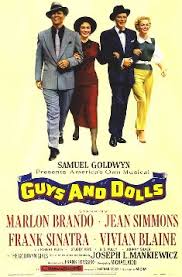
GUYS AND DOLLS
US, 1955, 149 minutes, Colour.
Frank Sinatra, Marlon Brando, Jean Simmons, Vivian Blaine, Stubby Kaye, B. S. Pully, Robert Keith, Sheldon Leonard, George E. Stone.
Directed by Joseph L. Mankiewicz.
Guys and Dolls was one of the prestige musicals of the mid-'50s. It was produced by Samuel Goldwyn with all his lavish techniques - as well as the Goldwyn Girls! The screenplay and direction were by Joseph L. Mankiewicz, Oscar-winner for A Letter to Three Wives and All About Eve and director of a wide range of prestigious films in the '40s and '50s. The film was based on the play with the book by Jo Swerling and Abe Burrows, adaptor of many plays and writer of screenplays at this time e.g. The Solid Gold Cadillac. The story is pure Damon Runyon and the comical gangsters of his New York world.
The Cinemascope colour photography is attractive and the sets lavish. The costumes were by Irene Sharaff. The music and lyrics were by the famed Frank Loesser - and have survived popularly many decades after they were composed. The film's choreography is by Michael Kidd.
The casting of the film was quite offbeat. Frank Sinatra was tipped for the role of Skye Masterson but took the supporting role of Nathan Detroit when Marlon Brando was cast against type. Brando, in retrospect, does quite well with the comedy as well as with some low-key singing and dancing. Jean Simmons is an attractive Sara Brown. There is lively support from Vivian Blaine and Stubby Kaye. Character actors portray the humorously-named range of Runyonesque criminals. The film is a pleasant blend of American dream as well as critique of it. The Salvation Army is used as the symbol of righteousness and virtue.
At the time, many critics found the film ponderous. In retrospect it seems quite attractive and the musical has been revived many times on stage - receiving prominent re-staging all over the world in the early 1980s.
1. An enjoyable and classic musical? The impact of the film? A piece of Americana: the Runyon characters, the world of New York, the police, the American Dream?
2. The production qualities: Samuel Goldwyn’s lavish budgeting? Joseph L. Mankiewicz literate score and serious direction? The offbeat casting of the stars? The quality of the choreography? The sets and costumes - especially Times Square, Havana? A cartoon, short story, comic New York and America?
3. The importance of Damon Runyon's stories and characters: language, slang, syntax? The idiosyncratic tones? The language being captured in song? Especially Nathan Detroit's and Adelaide's songs?
4. The contribution of the choreography: the opening, the overture, the types? The comic routines? The finale? A dancing musical? The staged numbers? The movement and vitality of the film? The film as a singing musical: mod, revelation of characters, action, situations?
5. The presentation of the two lifestyles: admiration and critique? The background of religion, repentance? No repentance? No sinners! The Salvation Army, its work, singing in the streets? The General, the prayer, the prayer sessions - and 'Sit Down. You're Rocking the Boat'? The religious marriage at the end? The use of the Salvation Army as religious symbol? The poking fun at prim and proper religion? The respect for authentic values? The contrast between Salvation Army and Damon Runyon criminals?
6. The serious underlying theme of religion, repression, shadows, honesty? Sara and her falling in love with Sky ? The wager, the trip to Havana, her falling in love, being drunk. repenting? The change and humanising of Sara?
7. Sky and Marlon Brando's presence? The suave gambler, the bet, the need for a congregation? The attraction towards Sara? Her going to Cuba? The night in Havana and the songs and dances? Falling in love with Sara? The night of gambling - 'Luck Be A Lady Tonight'? The proposal? The finale? The sketch of the hero gangster?
8. Jean Simmons' prim style as the religious Sara? Strength. Salvation Army, loyalty to the General. to the work of the Mission, to the personnel of the Mission? The visitation? The attraction towards Sky? The false logic. the seduction? The night in Havana? Her singing and dancing? Drinking? The change? Her return? Happy ending?
9. Frank Sinatra's style as Nathan Detroit: smooth-talking., gambling, the seeming loser? Love for Adelaide? The long engagement? His place with the group? His marrying? The happy ending?
10. Adelaide and her love for Nathan. her work as a showgirl, the group of girls, her stage performances, her wanting to reform Nathan?
11. The focus on Brannigan and the police, the cool and sardonic observer of what was going on?
12. The range of humorously-named gangsters: Nicely Nicely, Harry the Horse, Rusty Charlie. Benny Southstreet? Their contribution? Their becoming members of the congregation - 'Sit Down, You're Rocking the Boat' etc.?
13. The film's artificial style in presenting Times Square and the gallery of characters that passed through it?
14. The title and its tone? Theme song? The big treatment and its evergreen popularity? The musical comedy styles? New York and types? Humour. values. good and bad? An American fable?
Published in Movie Reviews
Published in
Movie Reviews
Tagged under
Saturday, 18 September 2021 19:24
Guru, The
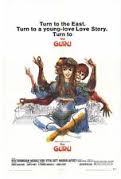
THE GURU
US/India, 1968, 112 minutes, Colour.
Utpal Dutt, Michael York, Rita Tushingham, Aparna Sen. Madhur Jaffrey, Zohra Seghal.
Directed by James Ivory.
The Guru is an unusual film, a collaboration of British, American and Indian talent. Written and directed by the American James Ivory, it takes up themes of the meeting of Indian culture with that of the West, especially in the form of the pop musician of the '60s. Michael York is the pop singer and musician who comes to India to encounter the guru who teaches in the musical traditions but opens his eyes to the differences in culture. The film was of mixed popularity in its day. Ivory had made such interesting Indian films as The Householder, Shakespeare Wallah. In the '70s he was to make the very fine study of India and England, The Autobiography Of A Princess. Ivory also tried his hand at the nostalgia film about Hollywood, The Wild Party. His Roselands won acclaim. The Guru is an interesting addition to his canon of work, highlighting the themes of the meeting of East and West.
1. The appeal of this film? For what audience was it made? British and Indian audiences? Overseas audiences?
2. What was the main emphasis of the treatment? Comedy, satire, humanity?
3. The emphasis of the title on the guru himself? The role of gurus in the modern world? Western interest in eastern gurus? The indication of the theme? The irony about the guru himself?
4. The importance of the atmosphere of India. locations and people. colour? The British stars inserted in this Indian atmosphere?
5. The importance of India as a place, its Hindu way of life, the approach to life in India and the Hindu background? The theme of the clash of the two cultures? The heritage of India and the past.. its heritage in the present? Its interest in the west? The clash of the two traditions? The differences in mentality? How well were these themes treated? Which sequences illustrated them best?
6. Music as a symbol of India? The westerners trying to acquire eastern music and Indian culture?
7. Tom Pickle as the hero? The ballyhoo of his arrival, his attitudes, concert? His reason for visiting India.. for meeting the guru? His respect yet his casual British way? His being moved by India? And yet the involvement in the beauty contest and the atmosphere of the west in India? His journey? His relationship to Jenny? His concern and his final decision to leave?
8. Jenny: her background,, her money, the reason for her taking lessons? Her worship of the guru? His attitude towards her? Her involvement with Tom? Her living in a world of fantasy, the idealisation of India? A dream world? The significance of her dream and her illness? What future? What had she learnt by her experience in India?
9. The guru himself: how interesting a personality, as a typical Indian, his relationship with the west? His skill his attitude towards music? His liking to be in the limelight? His peevish attitudes and moodiness? The sequences of his relationship with his wives and the conflict? His capacity for violence? The contradictions in his character? The importance of his visit to the guru? The ending and the symbolism and meaning of his walk along the shore?
10. The portrayal of his wives? Their differing personalities, influence on him, the differing attitudes of the guru to them? The impact on Tom and Jenny?
11. The insight into the Indian people, admiration of India? The young, the change to the west?
12. How much insight into human nature does a film like this offer?
Published in Movie Reviews
Published in
Movie Reviews
Tagged under
Saturday, 18 September 2021 19:24
Guns of Navarone, The
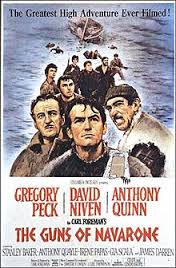
THE GUNS OF NAVARONE
UK, 1961, 156 minutes, Colour.
Gregory Peck, David Niven, Anthony Quinn, Stanley Baker, James Darren, Anthony Quayle, Irene Papas, Gia Scala, Richard Harris, James Robertson Justice.
Directed by J. Lee Thompson.
The Guns of Navarone is one of the best known of Alistair Mac Lean's novels and probably the most successful of the film versions of his books.
The film shows Gregory Peck and Anthony Quinn at their most typical. The story is also a typical Mac Lean story - high adventure, an impossible task, heroic hero and a spy who is the least suspected person. This film also offers some spectacular scenery and big sequences such as the scaling of a cliff and the destruction of the guns.
1. Good adventure? Structure - days and hours, maps. introductory narrative, suspense? Greek settings - visual beauty, sense of authenticity? Impact of themes - war, responsibility, group work, loyalty, betrayal, courage?
2. Was the mission too far-fetched? Given the fact of the men on Keros, what risks had to be taken to get the men off? Were the risks to destroy the guns worth the lives of the saboteurs? How did the comment by the Australian pilot add to the moral significance of the choices to be made? The speculation by Jensen about the success of the mission and the lives to be lost?
3. Were the people chosen for the mission interesting characters? Comment on their personalities and backgrounds. Could the audience identify easily with each of them? Mallory: Gregory Peck type hero, language, mountain climbing qualification, leadership qualities, the decision he had previously made, especially on Crete, relationship to Andrea. to Franklin? A trustworthy person? What prospect of success did he see?
Franklin: his luck, sense of responsibility and ambition, friend ship for Mallory, contribution to the mission? Andrea: Cretan, war record, death of his family, attitude towards Mallory: devotion to waging war.. deadliness?
Brown: professional war killer, abilities.. growing disillusionment.. nervousness with himself?
Miller: professional and educational background. abilities with explosives. lack of ambition for promotion, cynicism. attitude of non-involvement, antagonism?
Pappadimos: native of Keros, Greek background, American background, a killer with killing in his blood?
Comment on the interaction of each on the other, especially
towards Franklin as leader, towards Mallory as the expert who had to take over leadership, as regards the decisions that Mallory made - especially the criticisms of Miller. Brown's taking hold of himself. Franklin's dependence on them during his injury. Andrea's knowledge of the Cretans and his kind of leadership?
4. Was the plan an interesting possibility? Human endurance for fulfilment? Motivation that thousands of lives had to be saved?
5. The voyage to Keros. the boat itself, the encounter with the German and the demand on nerves before the mission started? The storm sequences, saving themselves and the weapons?
6. Climbing the cliff; difficulty, ease? Franklin hurting himself? The initial encounter with the Germans on the cliff and the realisation that the mission was real?
7. How were the Germans presented in the film? As real People waging a war; as ordinary soldiers, doing their job? Were the German soldiers presented well in contrast with the SS torturer?
8. What motivated the resistance on Keros? Did the Greeks have any other choice? (The background of Anna's torture. picturing of the arrests and threatened torture; torture of Franklin.) How well organised were the resistance?
9. Did Mallory make the right decision in giving Franklin false information? In leaving him to be tortured by the Germans? What right did he have to do this - Franklin's life and suffering compared to the rest of the group, with the men on the island?
10. The dramatic impact of the events on the island; getting towards the town? Hiding in the hills? Being pursued by the Germans? Arrest of Andrea, of Mallory and miller in the town square?
11. Maria and her brother being reconciled, women in the resistance? Anna - her torture and being dumb? Maria's determination to resist and her admiration for Anna? Were you surprised that Anna was the traitor? Was there any alternative to execution? Why did Mallory find it difficult after Miller's taunts? The significance of Maria' shooting Anna?
12. The importance of Andrea's performance during their arrest and their subsequent escape? Far-fetched or authentic?
13. The changing of the plan and the use of the German uniforms? Was the loss of German life necessary for this plan?
14. Why was the final confrontation between Mallory and Miller important? How did it throw the themes of the adventure into central focus? Did Miller have truth on his side? Did Mallory? Or did Miller capitulate to Mallory too easily? Did this make the whole thing too heroic?
15. How exciting was the final execution of the plan; getting into the gun area, Miller's ingenuity in setting up the guns for explosion, their escape, the actual blasting of the guns -with the suspense because it didn't happen at first?
16. Why did Brown and Pappadimos get killed? Were they killed by the Germans or by their own temperament - fears and lust for killing?
17. Were you glad that the ending was a happy one? What had been achieved by the end of the film? Are films like this too heroic? or do they show something of human endurance and courage?
Published in Movie Reviews
Published in
Movie Reviews
Tagged under
Saturday, 18 September 2021 19:24
Guns for San Sebastian
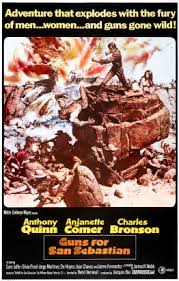
GUNS FOR SAN SEBASTIAN
US, 1967, 115 minutes, Colour.
Anthony Quinn, Anjanette Comer. Charles Bronson, Sam Jaffe.
Directed by Henri Verneuil.
Guns for San Sebastian is a routine Western directed by Henri Verneuil who has made many films in imitation of American film styles, particularly gangster and robbery films like The Burglars, The Sicilian Clan, The Night Caller. Here he relies on the expected response to Anthony Quinn and the novelty of seeing him in a friar's robes. Charles Bronson has a supporting role in the days before he was famous.
1. Was this just another Western or did it have a different theme and slant? Did it raise any issues not common to the run-of the-mill western?
2. How complicated was the situation in Mexico presented by the film - Spaniards. Yaqui Indians. mixed breed peoples? What had caused hatred and disruption in this situation?
3. What kind of man was Leon? Was it clear why he was hunted? Was he just an ordinary violent. sensual bandit?
4. Religion played an important role in the film. What was shown in its favour? What against it? were these praises and criticisms valid?
5. Fr Joseph and sanctuary? Is the Church's old power of sanctuary a good thing? Was Fr Joseph right to protect Leon and help him escape? Why? How harsh was Fr Joseph's being relegated to San Sebastian? How good and sincere a man was he? Why did Leon continue to help him?
6. Why did Fr Joseph ring the bell? How cheap was life in Mexico if Fr Joseph could be shot so casually?
7. Why did Leon continue in San Sebastian as the villagers' priest? Why did he wish to help them? To succeed in his own life? They said he gave them a vision. What was it?
8. How primitive and superstitious were the villagers - their hailing Leon and their belief in the miracle? Why did they quickly lose faith in Leon when their village was raided?
9. What role did the girl play in the film? As a test for Leon and what he was doing in the village? Her confession?
10. Why did Leon go to get guns for the people (and the contrast of the rich life with the poor village life?)?
11. Why did he rally support again with the guns? How important was it for the people of such an outlying area to be secure and feel protected? Did the film show the community's spirit well in its rebuilding and arming?
12. How well-filmed was the siege? Was it just another Western siege or was it better and more significant? How spectacular was the bursting of the dam?
13. Were the half-breed people well presented? why did the villain have a chip on his shoulder and work with the Indians?
14. What had Leon achieved by the end of the film - for the people, for himself?
15. What did the film have to offer in the role of a priest among people? What impact for good - both spiritual and material -can a priest have? Leon, Fr Joseph, the pompous Bishop, the new priest at the end?
Published in Movie Reviews
Published in
Movie Reviews
Tagged under